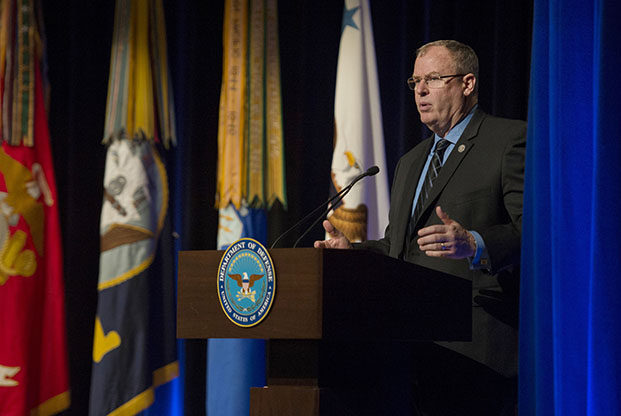
Obama administration Deputy Secretary of Defense Robert Work (shown here at a Pentagon awards ceremony in 2015), denied that the Pentagon has ignored space issues at a CSIS meeting Monday in Washington. DOD photo by SMSgt. Adrian Cadiz.
The notion that the Pentagon has ignored space is “a crock” of “smelly stuff,” said Robert Work, who served as Deputy Defense Secretary from 2014 to 2017 under both the Obama and Trump administrations.
Speaking at a Center for Strategic and International Studies discussion on Monday, Work pushed back on the idea that the Pentagon has not paid sufficient attention to space—a frequent argument in favor of creating a Space Force as the sixth branch of the military.
The US, Work told the session, has the “most capable national security space constellation in the world, bar none, period, stop.” So, if space had not been given the attention it needed, the country would not be in this position, he added.
Ever since China’s 2007 demonstration of an anti-satellite weapon against one of its defunct satellites, Work said the Defense Department “has fully anticipated that a terrestrial war “ with Russia or China “would quickly extend into space.”
He called the notion that DOD had been ignoring this development “laughable.”
The Obama administration, he said, “did not want to hasten further militarization of space” and said that former President Barack Obama and his National Security Council believed that openly talking about space warfighting would “essentially make that a reality.”
Consequently, he said, “they proscribed the department from even talking overtly about space warfighting” and were “very, very cautious about approving space control capabilities in the budget,” even though the department pushed back.
Work said that in June 2013, then-Deputy Defense Secretary Ash Carter gave a presentation to Obama and the NSC outlining threats to the US space constellation, “and from that point on, although the department was still not authorized to speak in unclassified forum about space warfighting, we were given a green light to start to pursue, in earnest, space superiority.”
“I can say with some confidence that, given the post-BCA [Budget Control Act] budgets and all of the competing requirements that we were faced, we were moving at the fastest speed possible, given available resources,” he said.
“Can we pursue these space capabilities faster and do better? Yes, and by all means we should do so. Will creating a separate Space Force guarantee that we will? Not necessarily,” he said.
But citing the desire of Congress and President Trump for more action, he lauded initial steps the Pentagon is taking, including restoring the unified space command and possibly the establishment of a space development agency, if it has a culture of innovation and really pushes out capabilities fast.
Having a Space Operations Force, he said, “is critical, because it really is about culture here.”
“We want to instill upon all those who control assets in space … that space” can no longer can be considered a function, “it is a warfighting mission,” he said. “Whether or not we get to a separate Space Force, I think, is an open question, and it might ultimately be the right answer, but I want to assure everybody in the audience that the Department of Defense never ignored space.”